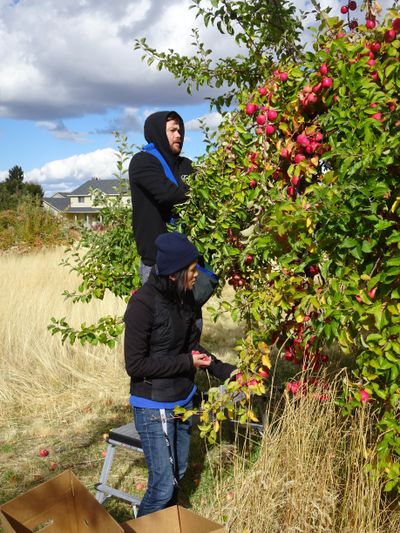Gardening: Don’t let your trees’ fruit go to waste

Got a fruit tree in the backyard that you don’t pick? Or raspberries and blueberries you can’t pick fast enough? If this is your challenge, its time to sign up your tree for gleaning with the Spokane Edible Tree Project.
Since 2013, the Spokane Edible Tree Project has gleaned tens of thousands of pounds of apples, pears, plums, peaches, apricots, cherries, raspberries, blueberries and other fruit from Spokane backyard trees and bushes. The fruit is donated to local food banks where it gives people the gift of fresh fruit.
To do this, SETP registers backyard fruit trees and bushes prior to the growing season. When the fruit is ripe, a crew will come and harvest it. In return, SETP asks that tree owners care for the tree. To support this, SETP also provides education opportunities for tree owners and the wider community on how to care for their plants while waiting for harvest.
The first step is to register your trees through SETP’s website at spokaneedibletreeproject.org. Now is the best time to get your plant on the list. The second step is for owners to provide needed care, so the fruit is in good shape for harvest. Food banks can’t take damaged fruit. This will involve watering, thinning and pruning and organically controlling insect pests. The last step is to call SETP when the fruit is ripe and it will arrange a crew to come harvest.
This year, SETP’s Fruit Tree Education Series will be series of four informal educational talks at Trailbreaker Cider in Liberty Lake. Yours truly and other community experts will be talk at the sessions.
On Tuesday, I will be talking about basic fruit tree care including tree selection, watering and fertilization, pollination and insect scouting. The March 28 session will cover the basics of fruit tree pruning. The April 25 session will cover organic pest control for codling moth and apple maggot in apples, cherry fruit fly in cherries and peach leaf curl in peaches. In the last session on May 30, I will be talking about how to develop habitat for pollinators, butterflies and beneficial insects that benefit your trees and the rest of the garden.
There will be a hands-on pruning workshop on March 18, at SETP’s partner organization Resurrection Episcopal Church in its restored orchard.
The times and address will be on SETP’s website shortly. Bring sharpened hand pruners and loppers.
Now to change subjects. I recently talked with my old friend the legendary Ed Hume of Hume Seeds in Puyallup, Washington. Hume Seeds is a long-standing Northwest-based seed company that produces regional adapted seeds that are popular with gardeners. Along with seeds, Hume has generously given his expertise to gardeners all over the Northwest.
His message to gardeners is if you have a favorite seed you can’t live without, buy it now before supplies run out. Hume said the seed industry like other industries is feeling the disruption in supply chains, personal and weather.